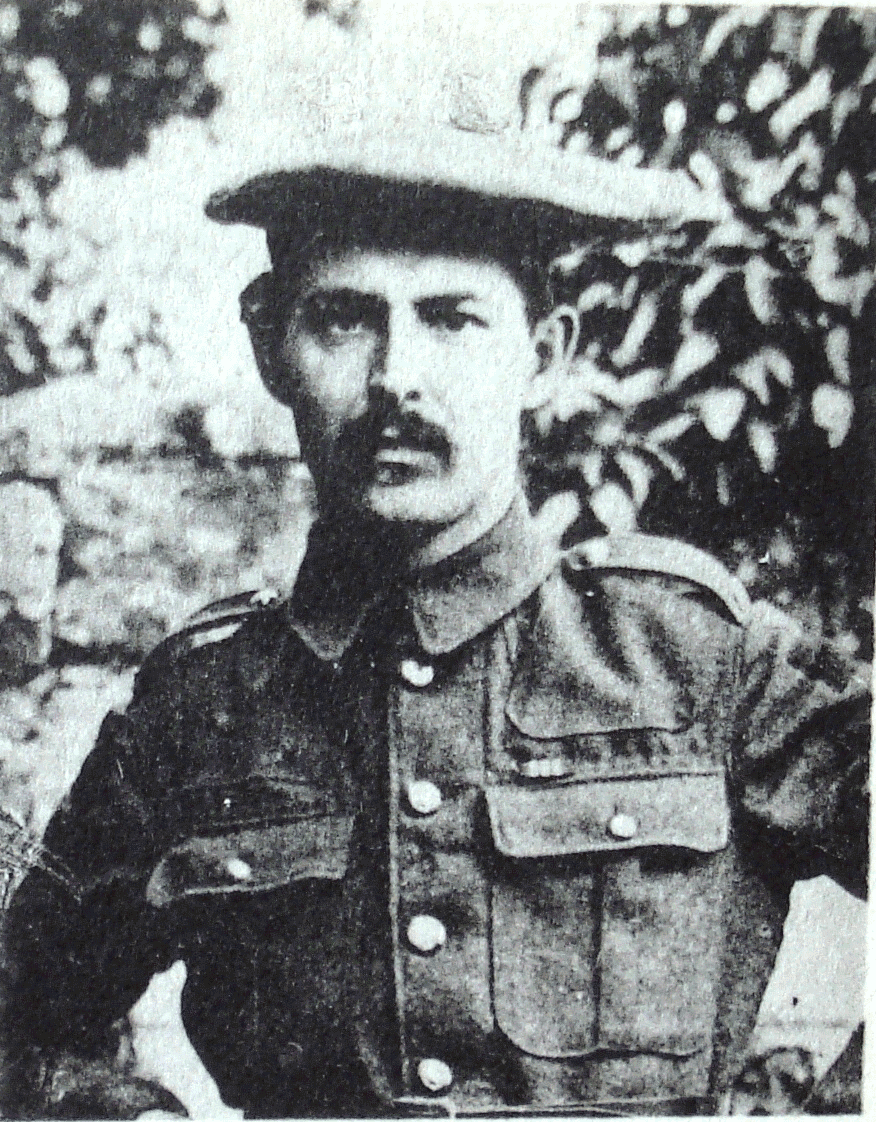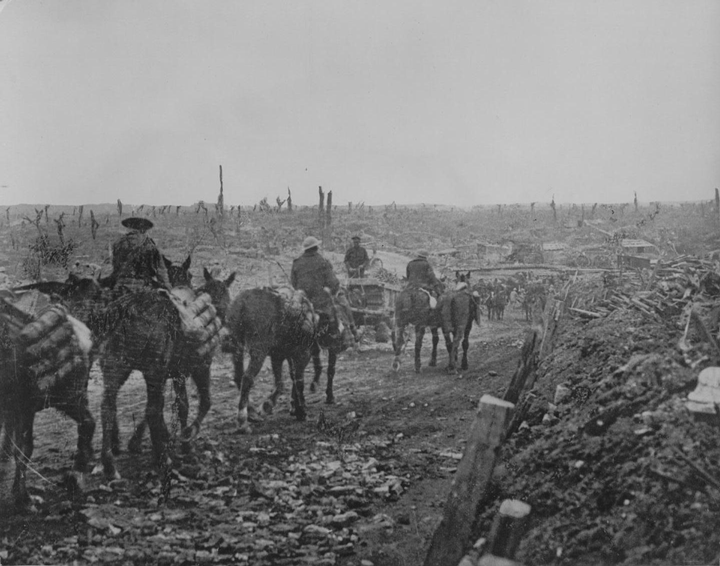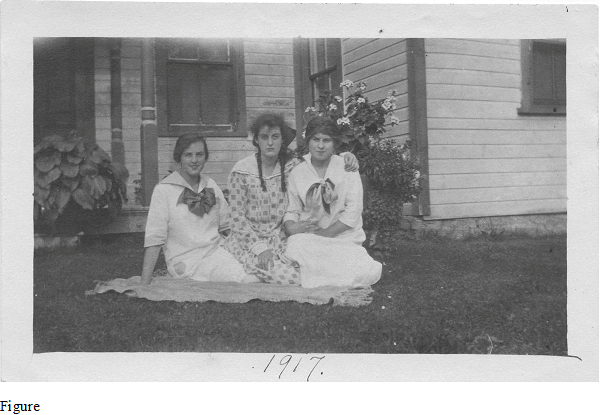1917-09-30
Charles Goodwillie

Mid-March 1917, Elmo is still complaining of headaches and dizziness. At the end of the month he is discharged, deemed “likely to become efficient in six months.” In April he takes $60 of his pay, and goes on a week’s leave. April 5, Duff is wounded in the hand and leaves France for England.
The only Metcalfe boy still in the field with the 73rd for the great Canadian attack at Vimy Ridge on April 9 is Corporal Charles Goodwillie. Does Charlie know that Ross and Elmo have been telling the girls in Metcalfe that he is with the Quartermasters Stores because he is afraid of the shells? Is that what drives him to “conspicuous gallantry” during the battle? In charge of the Company kitchen, he carries tea and soup from the canteen up to the front trenches to the exhausted troops who are making the assault. More than ten times on April 9 and 10, he voluntarily goes forward under fire to deliver this simple meal. Charles Goodwillie is no coward. Two months later he receives the Military Medal.
After Vimy, the 73rd has lost so many men that the Battalion is disbanded and the surviving men are reassigned. April 19, Charlie joins the 13th Battalion . In May, Elmo is attached to the 20th Reserve Battalion at Shoreham. He remains in England until the end of the summer of 1917. Ross’ doctor refuses to send him back to France because he is not yet nineteen years old.
In the first week of September, Elmo arrives back in France. He joins B Company of the 13th Battalion at Bouvigny-Boyeffles. He is immediately back to rebuilding and manning trenches and dodging shells.
After two weeks in the trenches he collects $25 of his pay and goes on leave.
Transcript Letter
1917-09-30
[Post Card]Glasgow, [Scotland]
Sept. 30 [1917]
I have been travelling a little since I last wrote and am now on leave in Scotland. How is everything in the old town? Hope I spend my next leave there.
Best of Luck
From
Elmo
Part 7, Letter 2, May 22, 1918
After reading the description of Passchendaele, what surprises you about his letters on May 22nd and July 11, 1918?
Transport to the Front


Passchendaele
Duff is assigned to the 13th Battalion on October 10, 1917, and Elmo returns from leave on October 14. Soon the boys from Metcalfe are marching together again. By October 23, Elmo is back at Hazebroucq. And then by bus he arrives at the outskirts of Ypres. Back where he started just over a year ago. And it is still raining. He camps under canvas. Fires are forbidden. The tents flood. The air raids are spectacular.
On October 26 the Canadian assault on Passchendaele begins. The 13th Battalion is not in the front lines. They start their fight repairing a broken corduroy road. Digging soupy dirt in the rain, in their kilts, rotating through eight hour shifts. The mud is impossible, the casualties appalling. Then the Battalion struggles forward to hold positions recently captured. There is no cover at the front. The quagmire is the worst they have known. The tracks are impassable. Corpses are everywhere. On November 8, they are pulled back. Three days later they cross Ypres to the station, and entrain for Brandhoek, Belgium. No one looks back. They leave behind 5,000 dead Canadians and 11,000 wounded and missing. Among the dead is Duff’s brother, John Crerar.
The 13th Battalion goes directly to Arras. Elmo’s Company goes into the front lines for a week. November 25 they march out to La Coulotte. Two days later they bathe. They get new underwear. Exchange kilts for trousers. Repair their boots. Turn to face winter. Elmo votes in his first Canadian election.
After three days they move again and the Battalion rotates through the trenches in the Lens sector. There is a gas attack. More shelling.
They find billets for Christmas. The weather is bright and snowy – so Canadian. But not. Many billets have no roof or lack walls.
All January 1918 they are out of the lines training. But as February begins they go back to the front in the Hill 70 sector. By February 11 they are under fire again.
Sometime in February 1918, Elmo gets a transfer into the Battalion Transport Section. Transport is a ‘rear detail’, out of the front line of fire. Perhaps he gets the assignment because of his experience with horses on the farm. Most of the Battalion Transport uses horse and wagons. Maybe he learns to drive one of the Battalion’s trucks. Anyway, “No more trench duty,” he hopes. The Battalion does another cycle through the support lines, front lines, and reserve at Bracquemont. But this time Elmo is ‘bomb proof’. He hopes.
In Metcalfe, housework bites deeper into Fannie’s time, as her mother remains ill. There is doubt whether Fannie will be able to stay in school and catch up in time for her exams.
On March 21, the Germans launch a major offensive across fifty miles of the front. April 4 the Battalion is sent to a reserve position near Arras. German successes strike panic. Rear details, including Transport, are reorganized into a provisional company for action at the front. Elmo might not be ‘bomb proof’ after all. But nothing comes of it and the Battalion is pulled back.
April 8, they start a week in the front lines in the Feuchy-Fampoux sector. Then back to billets at St. Aubin. The kilts are reissued. Spring is official. They rotate through the lines again Late April Ross is finally allowed to rejoin the 87th in France. May 6, Elmo returns to St. Aubin.
In May 1918 the entire Canadian Corps becomes the General Headquarters Reserve. There will be no more fighting for three months. Dodging bullets in the mud of the trenches is exchanged for swimming in the river, playing sports, and singing around the campfire. Now the whole Battalion is ‘bomb proof’
Transcript 1918-05-22
Somewhere in France
May 22, 1918
Mon Chère Fannie Maud,
Alas, alas my hopes have been satisfied by your letter of April 23. I was beginning to think you had forgotten yer old pal but that big fat letter has settled it. I quite understand that you must be very busy with your school-work and knowing you of old, I can see where you will be working night and day. eh! what! Don’t overheat your brain whatever you do ‘cause that wouldn’t do you know. And so you may have to go to Ottawa to write eh? That won’t be very pleasant, will it? Anyhow I wish you the best of luck and hope you go through with honors at least, as I am sure you will. Wish I could drop in for a few nights and help you review; do you know I think I’ve forgotten nearly all the little I did know. Say, is Lyla Cameron writing this year?
It will soon be two years since the “three hobos” left Ottawa to come over here and believe me it has been the longest two years of my short life: it seems more like five. I am afraid it will be a long, long time before we get a leave to Canada; it seems too good to even think of: Just imagine a month’s furlough in dear old Metcalfe eh what. No such luck for a mere buck private though.
Oh say Fannie that was some experience you had with H.C. ha.ha. I can almost see you trying to patch up an excuse in a hurry. How I would have liked to have been behind that big telephone post at that critical moment; I am sure it would have been worth at least a month’s pay. N-n-never mind Fannie; I-I h-hope w-when I g-g-get b-back y-y-y-you w-won’t h-h-have a d-date on? Ha, haw, ha. That was a nice trick you played on him anyhow; tellin him you had a date on and then have to hunt up somebody to keep it with. I think you and “Miss Chris” are pretty near a pair of _ _ _ (I won’t say but you can guess). You asked me if I recalled the night ___ called and wouldn’t come in on your invitation even; now you know well enough that circumstances alter cases and I was the case that night “compris” will do better if I ever get the same privilege again though, ha, ha. Oh for those dear old days once more.
Must close for now as “duty calls”; will write more later. E.S.
May 24; 8 P.M.
Well here I am again. I tried to get finishing this yesterday but was away with my ‘honchos’ from 5 a.m. till seven P.M. so I didn’t feel quite fit for writing after that. It has been raining here all day which is generally the case on the 24th but it doesn’t matter to us as we don’t get holidays anyhow.
Yesterday I had a letter from Ross and one from Duff. Duff is on the wing transport now so I don’t see him at all; it is a good job and quite bomb-proof so he’ll be safe for awhile. Ross is back with his battalion his address is “A Coy”, 87th Battn. I am very, very sorry he is back again and hope he will be alright. I see Charlie Goodwillie every day or so; he is fine.
Say Fannie; you asked me about some snap and parcel; well I received your parcel at Xmas also the snap of you sitting on the verandah a long time ago and wrote in answer to both as soon as I got them but I have rec’d none since that. There seems to have been an awful delay in Canadian mail for there has been no parcels come for about two months; I don’t know whether they’re all being sunk or not. Oh say Fannie if you have a spare snap of you three girls (Hilda, Chris & yourself) I should be very, very pleased to have one: Duff got one and I think it is a dandy of you.
About that ring of Miss W’s; you don’t suppose there’s any trub between Charlie & her, do you? I never hear him speak of her but still I guess they’ll be alright if only he could get back; eh! what!
I guess conscription is getting more strict all the time; I would love to see Ed. B. out here with a pack on his back (not wishing him any harm you know). It will be so sad if Headly C. has to come won’t it? ha. ha.
I guess you won’t know what has struck me that I’ve written such a long letter but hope it won’t give you too great a shock. Tell Miss Byers there’s a line coming her way one of these fine days.
Well Fannie Maud I must close wishing you all success with your exams and the best of good times during the coming holidays.
With best of luck from,
Your Old Pal,
Elmo.
P.S. Will be looking for another good long letter soon, soon. E.A.S.
P.S.2 C-c-can I s-see y-y-you h-home some s-sunday n-night i-in t-the f-future? (Après la guere). E.S.
Letter 1916-05-07

The 13th Battalion is playing intercompany baseball and football. In June they move to Anzin. They build reserve trenches. Influenza arrives and by June 30 a quarter of the men are sick. Most recover quickly. July 1 Elmo gets a holiday and a big Canadian sports day. The Governor General and the Canadian Prime Minister are there. July 6 there are highland games. The war could be almost forgotten. Temporarily.
Transcript Letter
1918-07-11
July 11, [1918]
Dear Fannie,
Its pretty near time I was answering your letters of May 6 & 13; what do you think. Well here goes – please excuse pencil though as my pen is on the blink.
To start with it is pouring rain and the prospects are none too good-looking for clearing. I hope you are having better weather over there or it will be bad for the celebration to-morrow.
And so H.C. called again but you were out eh! Ha.ha. Oh Say don’t take advantage of the poor fellow and tell him off just because he can’t talk back very quick??? [smiley face] I can almost hear him trying to express his feelings. Ha.ha.
Was rather worry to hear of L.C. being sick but you can leave it to Miss White to see that she gets a recommend alright. I guess Ken Dow and Katie H[all] have it pretty bad by what you say; it must be awful to feel like that, what do you think?
Did I ever tell you that I was in the Transport Section? Duff and I were transferred to it in February then Duff went to hospital toward the last of March and got on his bomb proof job from there so I haven’t seen him since. The only difference in my address is that instead of “B Coy” it is “Transport”.
Thanks Fannie for your information concerning Ed & Kate; it was an awful shock to me but you can trust your pal to keep things mum. Really I think the world is going to the bad completely. There must be an awful uproar around “Saints Repose” now; eh what. I’ll bet old Charlie [Goodwillie] will be wishing he had let Ed enlist with us; what do you think?
Oh! As to that letter with the camouflaged address; a fellow I knock around with a bit, by the name of Holden, commonly known as “Hold-him” was writing beside me that night so I got him to write the address just to give you a surprise. Of course he had to have a look at your photo and he says “----I’d better not tell you or you might get a swelled head; anyhow I told him he had no chance for I had spoke first. (what do you say?)
I hope you got along as well with your final exams as you did on your tests. I suppose you’ll have heard from them by the time you get this. Be sure and let me know who are the lucky ones.
You’ll be tired reading this trash so I’ll wind up for this time. Be sure and write soon and give me all the news of the old town. If you only knew how welcome your letters were in this desolate country you’d be surprised for after all there’s nothing more welcome than a line from “A pal that’s true”.
Hoping you are enjoying the best of health;
Best Wishes from
Elmo
In mid-July 1918, the holiday is over. Elmo’s Battalion is back in the lines at Arras. Shells fall. It rains. The rear details again are formed into a counterattacking battalion. Again, they are not needed. The roller coaster continues.
The Battalion fights in the Battle of Amiens in the first week of August, and then in the second Battle for Arras at the end of the month. The Allies are counting victories but the casualties mount. They are replace by new men with limited training and experience. Elmo is an experienced veteran in comparison.
At the end of September, they are sent into battle at Canal du Nord. The bridge the men should cross is not there. They wade through the filthy cold water, their kilts floating up around them, the skirl of the regimental piper lifting above the machine guns. The Battalion casualty list for September counts 456 men. Four days later the Battalion is sent back into the fight at short notice. There is only a quick explanation of the plans. There is no liaison with the artillery. Soon, Canadian soldiers are being killed by their own shells. Others get lost in the confusion when the only officers who know the plan become casualties. The Battalion gains its objectives in the morning, but it has to pull back in the afternoon. Left among the dead is Lance Corporal Charlie Goodwillie. Not ‘bomb proof’ after all.
Elmo takes $45 from his accumulated pay and goes on two weeks leave. By the time he returns the tide is turning. Land occupied by the Germans since 1914 is being liberated. More German men and guns are captured. The Battalion follows the German retreat into untouched land beyond the devastated front. They are met by happy French people who offer the soldiers gifts of food and flowers. They stop at Fenain on October 23, and are still there when the armistice is declared on November 11, 1918.
